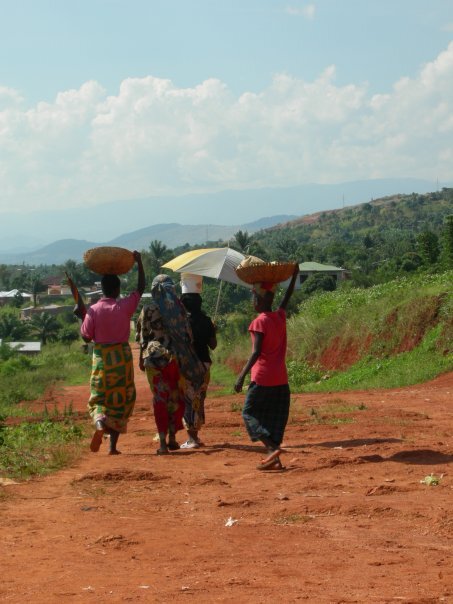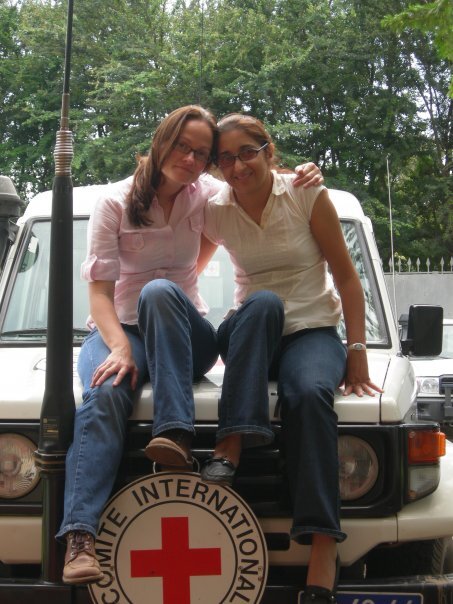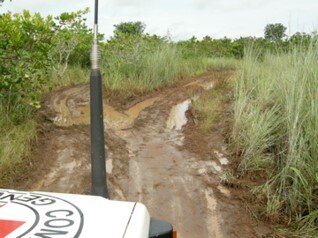Language Skills and Humanitarian Aid Work
Translation: Julie Summers
The Student Paper met Hrafnhildur Sverrisdóttir over Zoom to chat about her experience working with the Red Cross. After graduating from the University of Iceland with a BA in French in 2000, Hrafnhildur went on to study international relations at the graduate level, with a focus on human rights issues. Hrafnhildur has extensive on-the-ground experience, having done humanitarian work around the globe in collaboration with the Icelandic Red Cross, the International Committee of the Red Cross (ICRC), the United Nations, and other organizations. Today, Hrafnhildur works for the Icelandic Red Cross on projects related to international development and humanitarian aid.
Women walking / Contributed photo
What does your job with the Red Cross entail?
When asked why she decided to start working for the Red Cross, Hrafnhildur said it was her French language skills that led her to the job. She had worked in other countries before, with the UN in Kosovo and as an intern for the Organization for Security and Co-operation in Europe, and she wanted to go abroad again. “One of my acquaintances reminded me of the Red Cross. I got in touch and had an interview the next day,” she explained. Before she knew it, Hrafnhildur found herself at the headquarters of the International Committee of the Red Cross in Geneva, Switzerland. She went through a selection process that involved language evaluation, interviews, and projects. The Committee highly values candidates who can demonstrate proficiency in French, as French is the dominant language in many of the countries where they operate. French is spoken in a total of 29 countries around the world, 26 of which are in Africa, so it’s no wonder that aid organizations are eager to hire French speakers. The interview process went well, and Hrafnhildur was soon sent to work as a generalist delegate in the Ivory Coast. She lived there for just over a year, then spent another year doing the same job in Burundi.
“You may be going to work in a country where people’s worldview, opinions, and values are completely unlike your own.”
Red Cross delegates perform a variety of tasks. For instance, they may visit prisoners or detainees to evaluate the conditions in which they are kept and the treatment they receive. They also help search for missing people; the ICRC maintains a database of people who have been separated in armed conflicts, which makes it possible for them to locate people all over the world. A delegate’s other responsibilities include educating members of the military, law enforcement agencies, and rebel groups about international humanitarian law like the Geneva Convention, which is intended to protect civilians and property during armed conflicts. Hrafnhildur also did general aid work, distributed supplies and food to victims of conflicts, and worked with colleagues to inform soldiers and insurgents about humanitarian law. “That was one of my favorite projects, even though I was super stressed during the first meetings, which were conducted in French, of course.” She said it was very interesting to speak with armed individuals about what is and is not legally allowed in war.
Contributed photo
“You might be sitting there with your chin quivering, watching as parents met their children after months, even years of separation due to conflict.”
Valuable experience from constant learning opportunities
Hrafnhildur remembers many impactful moments from her time abroad, but what sticks out to her the most are her interactions with other people: “…those conversations and stories about [their] lives and experiences.” The people she met had often experienced difficult things, like the death of a child, but there were also happier times when Hrafnhildur and her colleagues were able to assist people. For instance, they sometimes succeeded in reuniting families, which was always a huge moment both for the families themselves and for the aid workers: “You might be sitting there with your chin quivering, watching as parents met their children after months, even years of separation due to conflict.”
Hrafnhildur recalled one specific memory that has always stuck with her from her time working with the Icelandic Crisis Response Unit in Afghanistan: “I was lucky enough to get to sit down with some Afghan women in their village, and they allowed me to join as they talked about childbirth.” They explained how an educational course taught by a professional midwife had prepared them to deal with births in their village. They wove in stories about their experiences before the course as well, and according to Hrafnhildur, “It was absolutely incredible!” That day, she got a glimpse into the world of Afghan women, something very few outsiders are allowed. She got to sit with them in a remote village, listening to their personal experiences, hearing about their own births and about society’s opinions of them.
Asked to identify the hardest part of her job, Hrafnhildur talked about witnessing people lose loved ones, particularly children. “For me, the most difficult thing has always been having conversations with mothers who’ve lost their children, sometimes more than one, perhaps because of conflict or from illnesses that we don’t have to worry about much in Iceland.” Some of these illnesses are treatable, but with a lack of medical care, they still kill many children. “It tugs at your heartstrings.”
Despite the challenges, all this experience, drawn from constant learning opportunities, has been extremely valuable. “You interact with people from different backgrounds, people who have different opinions and expect different things from life. And having had all the opportunities that I did during that period with the Red Cross and other projects is very valuable,” said Hrafnhildur. Plus, she said, having a standing invitation to visit friends all over the world is priceless. Her experiences have also broadened her horizons and strengthened her commitment to justice. “I have a very difficult time witnessing injustice,” she said.
Language skills key for humanitarian aid work
In closing, we asked Hrafnhildur if she had any advice for young people interested in doing aid work. Without hesitation, she recommended learning a language other than English, like French, Spanish, Russian, or Arabic. All of these languages will come in very handy for people interested in doing development and humanitarian aid work abroad. “I can say with absolute certainty that the Red Cross never would have hired me if I didn’t speak French,” she said. Language skills don’t just open up more employment opportunities, they’re key to cultural understanding. “Understanding the language of the country where you’re working gets you closer to the nation’s heart and soul and makes your time there more valuable,” said Hrafnhildur.
Hrafnhildur also talked about the importance of being prepared to be lonely sometimes and not expecting other people to think like you do. “You may be going to work in a country where people’s worldview, opinions, and values are completely unlike your own,” she said. She recommended having an open mind, following security protocols, and enjoying the experience.





